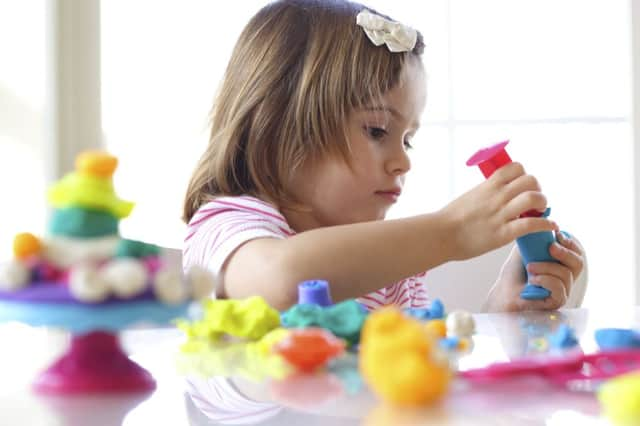Homemade play dough has enough salt to poison child, parents warned


Experts said just one gram of the dough could contain as much as 250mg of salt.
The UK’s National Poisons Information Service (NPIS), which issued the warning, said that while there had been no fatalities in children there had been a number of reports of pets being poisoned.
Advertisement
Hide AdAdvertisement
Hide AdRecipes for play dough are widely available on the internet. The instructions usually recommend mixing one part salt, two parts flour and one part water, then adding colouring. However, the advice from the NPIS is contrary to that found on many internet forums, where parents are told not to worry if their child has eaten play dough, because it is “non-toxic”.
It said commercially available play dough preparations also contained salt, but not in such high concentrations.
Professor Simon Thomas, director of NPIS, said while homemade play dough would have a bitter taste, it would not deter some children from eating it.
“A child weighing around 10kg would need to eat about 1g of pure salt to cause concern – that equates to around 4g of home-made play dough.
“It would taste very salty and unpleasant, which is probably why no cases have been reported, but some children have conditions which make them pick things up and eat them. If they were eating handfuls of play dough, there is a risk.
“If a child has eaten large quantities of play dough and doesn’t appear to be well then you should get them checked over. Common symptoms of significant salt ingestion are nausea, vomiting, irritability, headaches and for the child to be thirsty and tired.”
Marguerite Hunter Blair, chief executive of Play Scotland – a children’s charity and play organisation – said there were alternatives to using salt in homemade play dough.
“I’m not sure we’ve heard of this danger from salt in play dough. But play dough does tend to go everywhere. It is obviously not intended to be eaten but once it is on the floor it is likely to be picked up by small children who love to explore and put things in their mouth.” The About: Parenting website, which provides information and advice to parents, said: “Play dough ingestion is mostly harmless. However, it becomes more of a problem with a younger child who is more likely to eat a larger quantity of dough and physically weigh less, thus making ingredients like salt more of a toxicity risk.”
Advertisement
Hide AdAdvertisement
Hide AdThe Pet Poison helpline said dogs and cats could suffer a range of symptoms if they ingested play dough, including vomiting, tremors, seizures and falling into a coma. Treatment includes administering fluids intravenously and other measures to prevent dehydration and brain swelling.